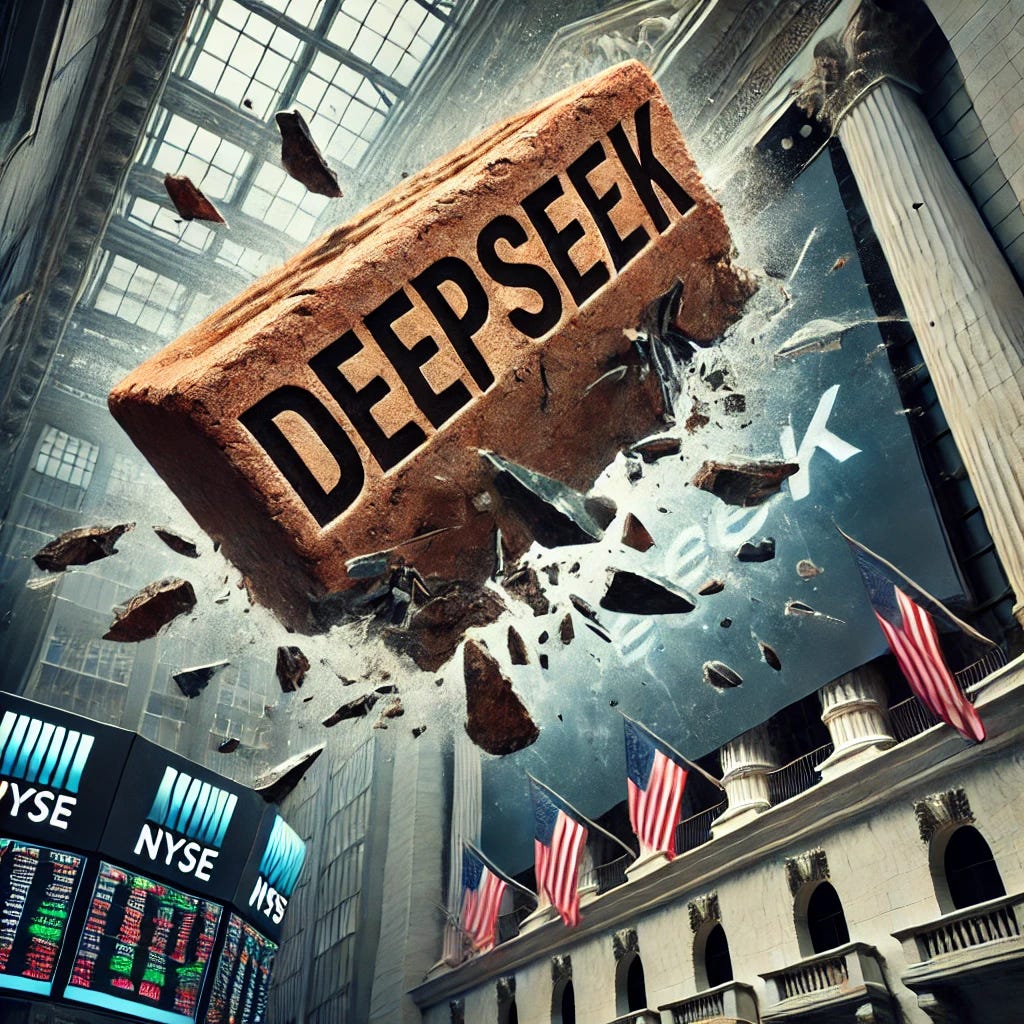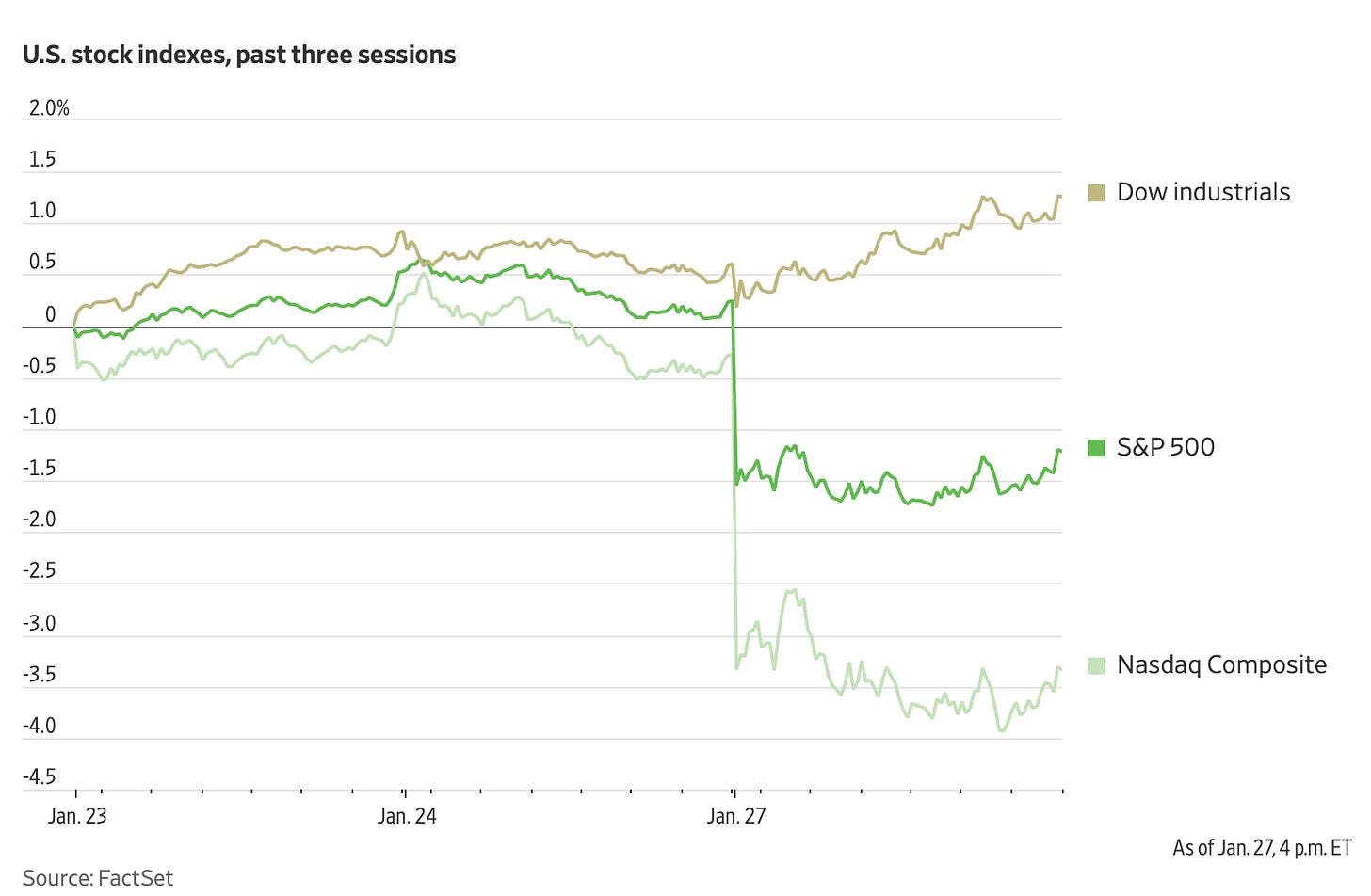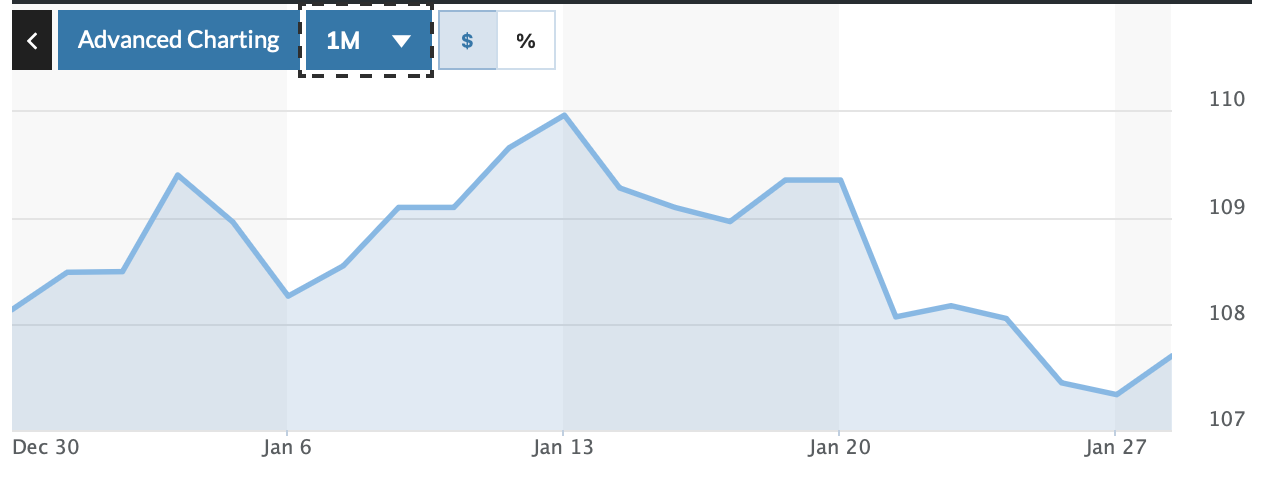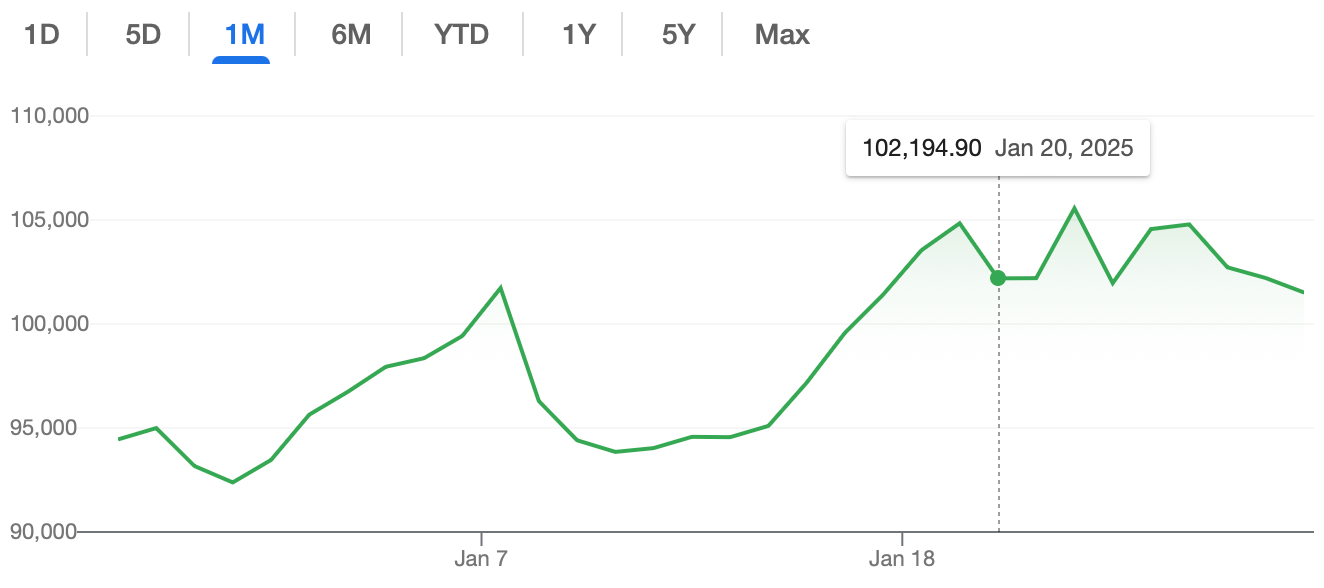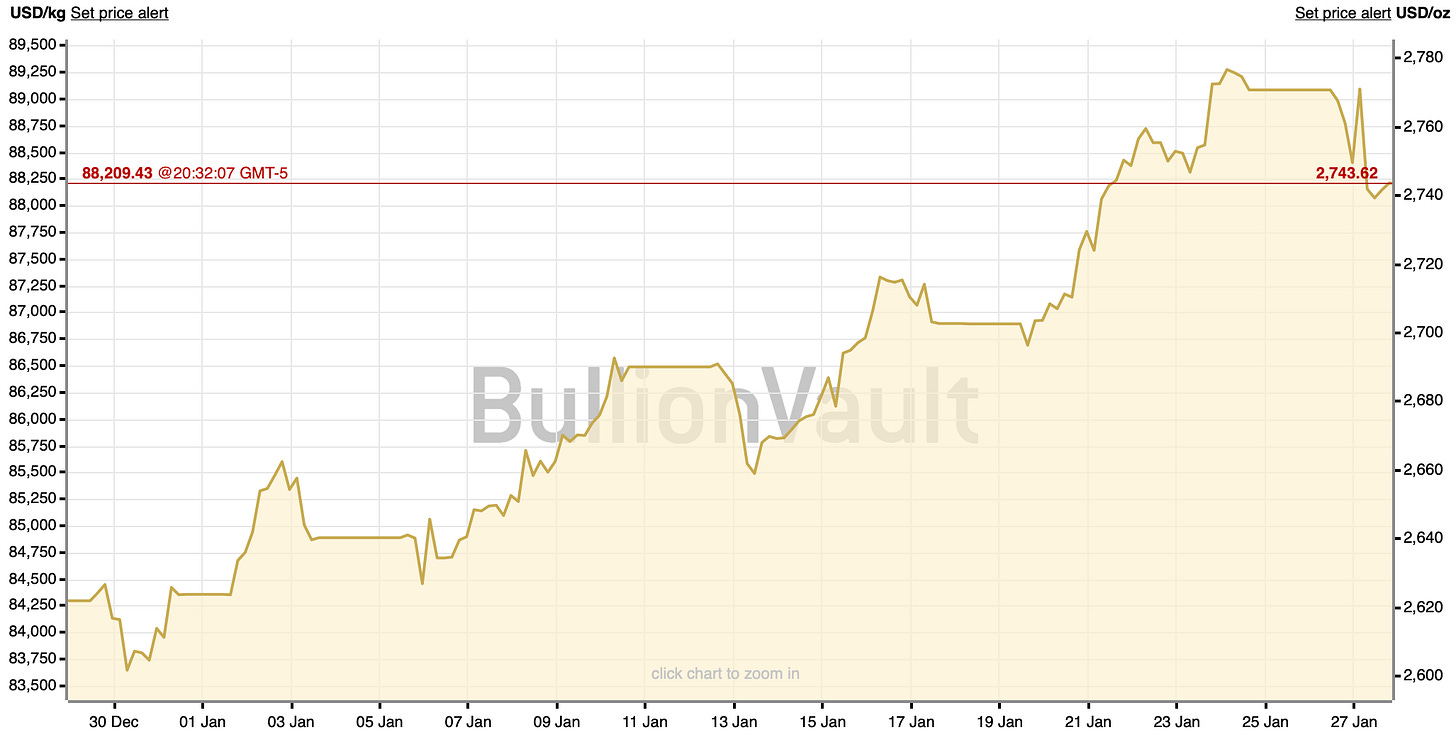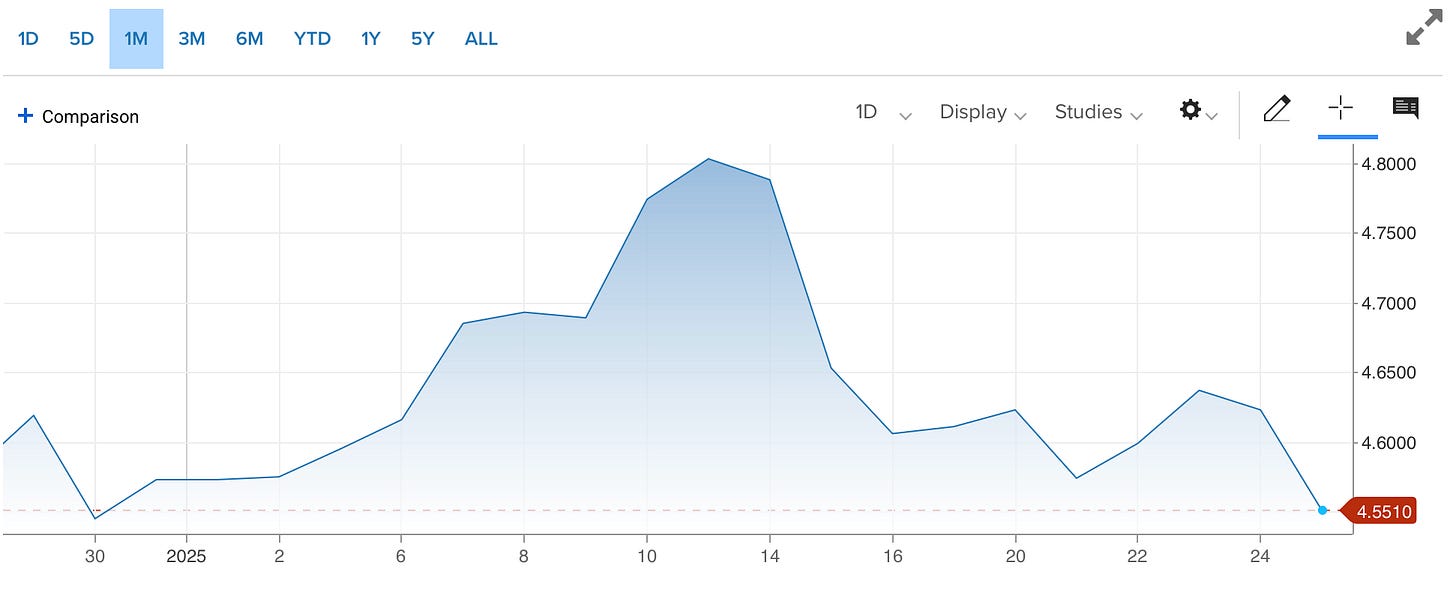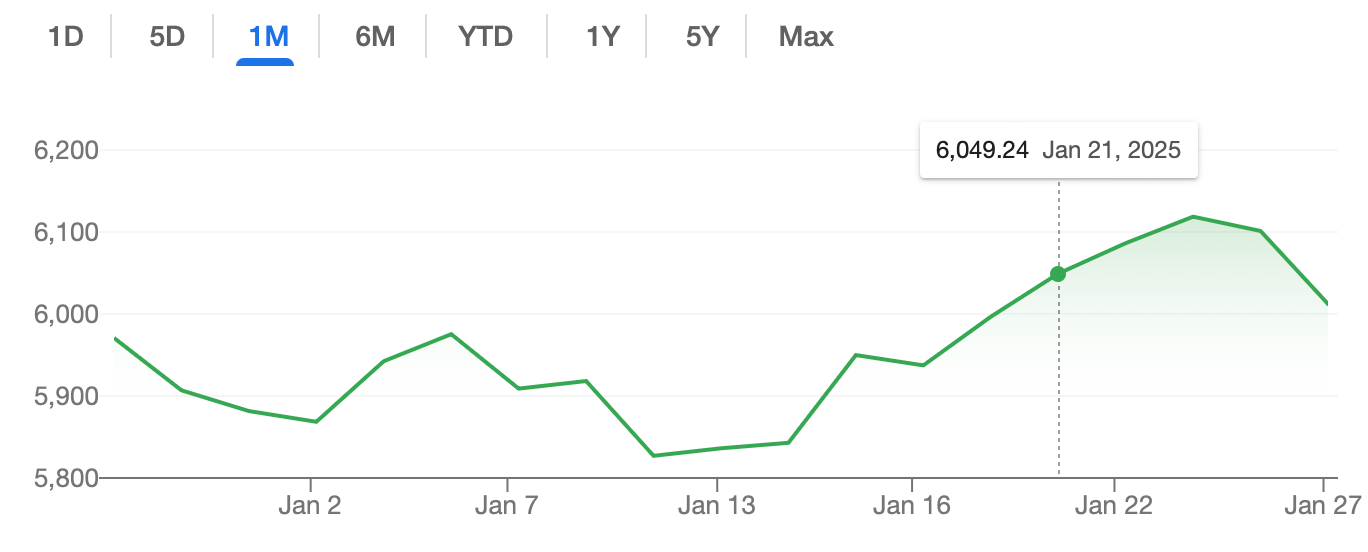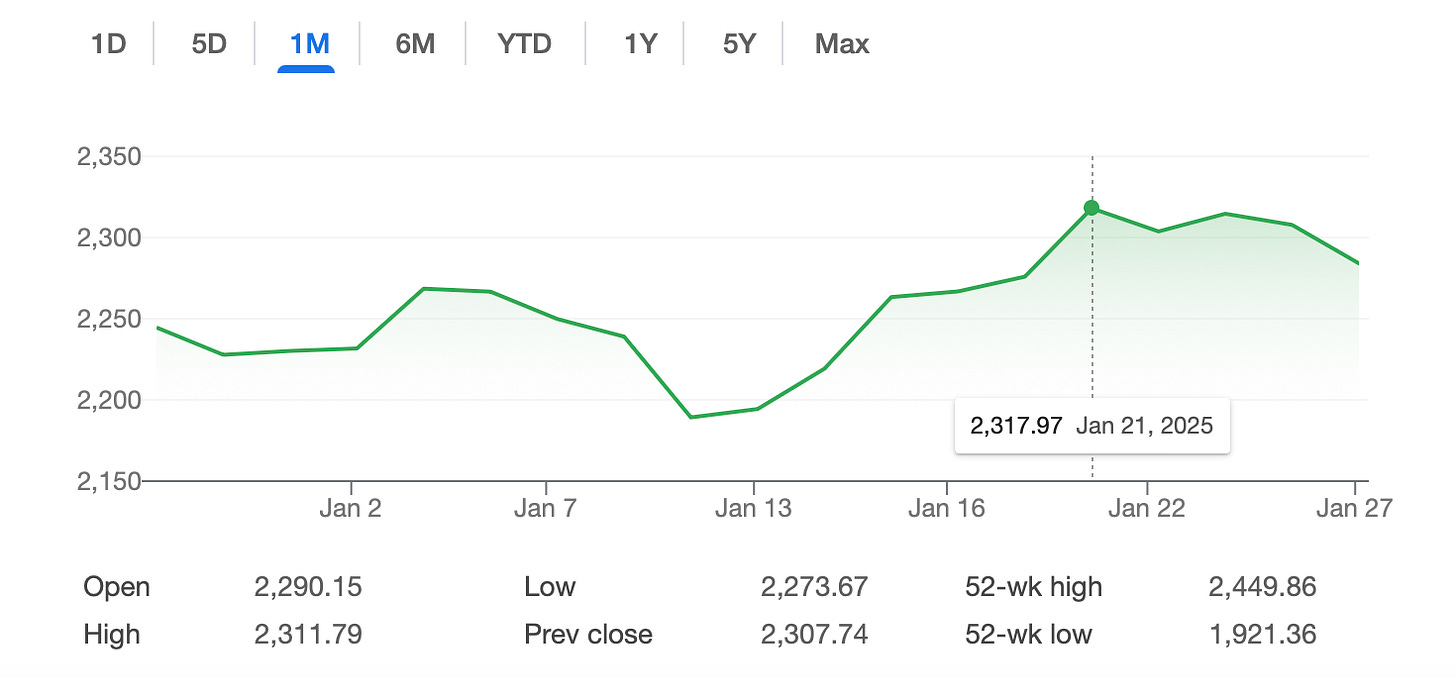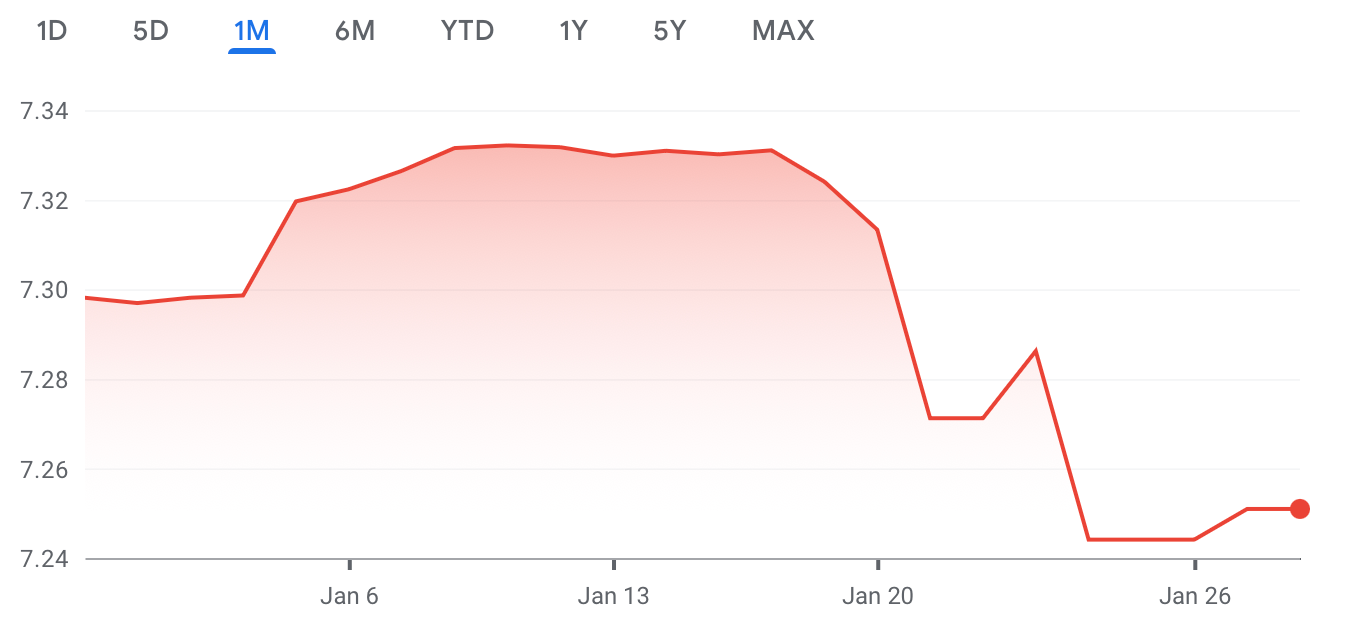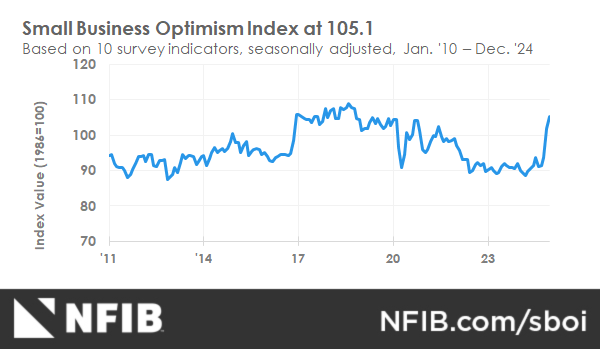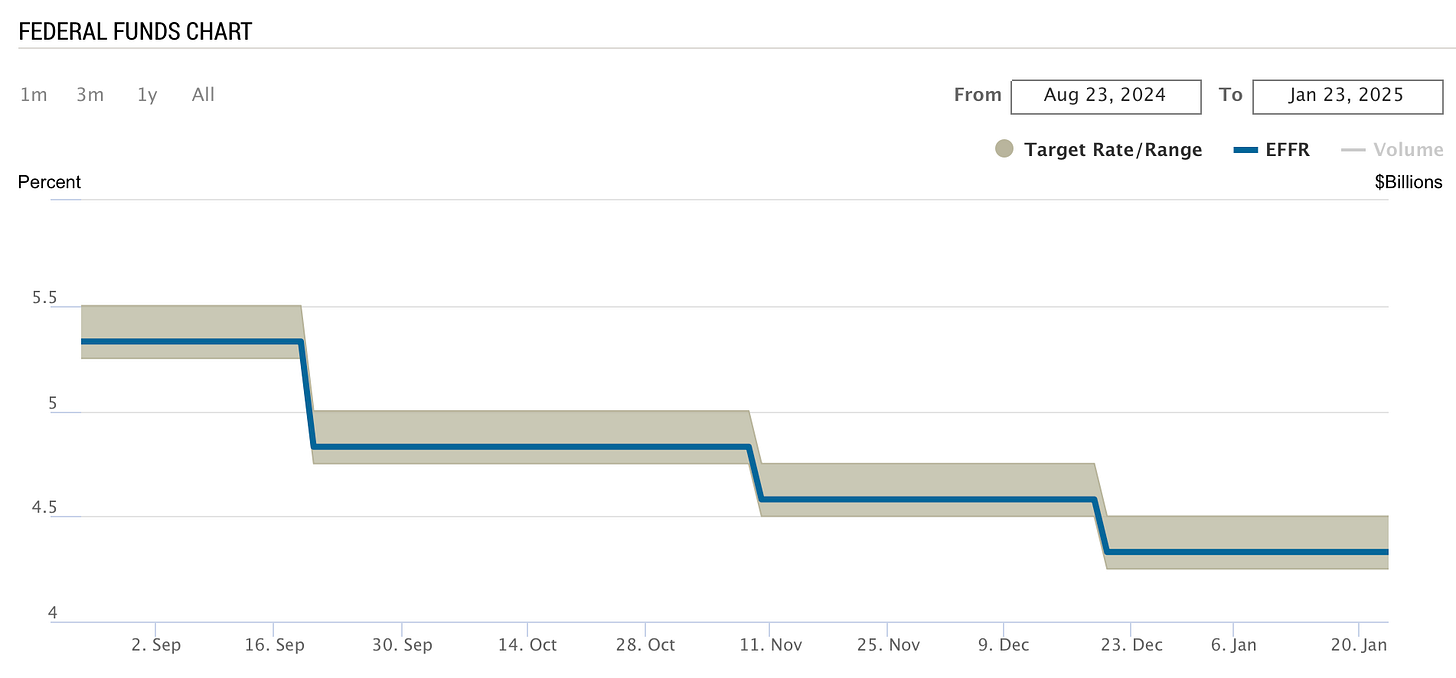TABLE OF CONTENTS
Market Recap: Keith McCullough on how DeepSeek is crashing markets
EQUITIES: Chris Vermeulen on why markets are on verge of breakout
STOCK IDEA: DOLLY VARDEN SILVER
ECONOMY: Richard Wolff on how a tariffs could bring about ‘catastrophe’
ECONOMY: Danielle DiMartino Booth on why massive job losses are coming
ECONOMY: Former Fed Chief Tom Hoenig on the ‘inflationary boom’
ECONOMY: Steve Hanke on Trump’s tax cuts, tariffs, and inflation
CRYPTO: Galaxy’s Steve Kurz weighs in on Trump’s crypto policies
TECH: Stargate is the ‘most important U.S. investment,’ says Arthur Herman
What to Watch
MARKET RECAP
Latest News. Markets were down on Monday, January 27th, after news that DeepSeek, a Chinese AI startup, is threatening U.S. artificial intelligence dominance.
Over the trading day, the tech-heavy Nasdaq was down 3 percent and the S&P 500 fell 1.5 percent. Nvidia crashed 16.9 percent, shaving off $589 billion in market capitalization.
Thanks for reading The David Lin Report! Subscribe for free to receive new posts and support my work.
DeepSeek’s new AI model, R1, is reportedly as efficient as ChatGPT-4, at one-thirtieth the cost. DeepSeek said it used older Nvidia H800 chips for training, spending less than $6 million in the process.
On January 26th, DeepSeek was the most downloaded app on Apple’s App Store.
Keith McCullough, CEO of Hedgeye Risk Management, said that DeepSeek had “the gun pointed right at the head” of Nvidia and other large cap tech stocks.
“[DeepSeek has] a far lower cost [than ChatGPT] and… a more efficient search on a narrower and, one would say, a more kind of expert field,” said McCullough. “Instead of just looking at the entire hospital with ChatGPT, [with DeepSeek] you’d be asking specific specialists.”
McCullough was referring to the DeepSeek’s programming, which allows the AI model to draw from domain-specific insights, as opposed to general-purpose outputs like ChatGPT. This allows for faster processing.
DeepSeek’s breakthrough suggests future opportunities for AI and tech, said McCullough.
“I think, generally speaking, there’s probably a lot of opportunity,” he said. “This is talking about super-expensive GPUs from Nvidia becoming much lesser of a cost, in terms of people having to have those chips.”
However, McCullough said that he would short Nvidia “on any bounce.”
“Before this [correction] happening today, revenues were going to decelerate through the year at Nvidia,” he explained. “It’s an expensive stock with growth slowing, [and] now [there’s] a huge competitive threat staring right at [it].”
Market Movements
From January 20th to January 27th, the following assets experienced dramatic swings in price (Please note that U.S. markets were closed on January 20th for Martin Luther King, Jr. Day). Data are up-to-date as of January 27th at 9pm ET (approximate).
TRUMP coin — down 17.2 percent.
Nvidia — down 15.8 percent.
Oracle — down 8.2 percent.
Moderna — up 16 percent.
Netflix — up 11.8 percent.
The following major assets experienced the following price movements during the same time interval.
DXY — down 1.5 percent.
Bitcoin — down 0.7 percent.
Gold — up 0.5 percent.
10-year Treasury yield — down 1.6 percent.
S&P 500 — down 0.6 percent.
Russell 2000 — down 1.4 percent.
USD/yuan — down 0.9 percent.
EQUITIES:
MARKETS ON VERGE OF BREAKOUT
Chris Vermeulen, January 21, 2025
Chris Vermeulen, Founder and CIO of TheTechnicalTraders.com, said that markets are on the verge of a breakout following Trump’s inauguration.
Vermeulen said that he is currently holding a U.S. dollar index (DXY) ETF, waiting to deploy cash.
“I’m hoping the stock market is going to have one more push higher,” he said. “Potentially in the next week or so, we’ll have another buy signal to re-enter the stock market. The Nasdaq has potential to run about 10 to 11 percent [higher].”
When it comes to bonds, Vermeulen predicted that they would “rise from the ashes” once the markets given the right signals.
“We need a lot of blood on Wall Street for them [The Federal Reserve] to start cutting some rates,” he explained. “Once they start doing that, bonds are going to put in, I think, a miraculous rally.”
Vermeulen also said that he prefers to hold gold as a commodity, as opposed to gold mining companies, citing the latter’s volatility.
“There is going to be a sweet spot to get into miners… [but] we’re not there yet,” he said. “Gold I think will hold its value and go a little higher. Gold stocks, I think they’re a struggle, they’re a higher-risk play.”
STOCK IDEA: DOLLY VARDEN SILVER (TSX.V:DV | OTCQX: DOLLF)
(Sponsored Post)
Dolly Varden Silver (TSX.V:DV | OTCQX: DOLLF) is emerging as a mining stock with strong prospects as silver demand surged in 2024. Located in British Columbia's mining-friendly Golden Triangle, the company offers high-grade silver exposure in a low-risk jurisdiction, making it an attractive play for investors seeking stability and growth potential. Industry heavyweights back Dolly Varden, with Hecla Mining holding a 12% stake and billionaire Eric Sprott owning 10%, both signalling strong confidence in the company’s future. Additionally, major institution Fidelity has invested 7.5%, further validating Dolly Varden’s potential. Positioned as a pure silver play in a safe environment, the company stands to benefit significantly from the rising demand for silver. With top-tier shareholders and a high-quality asset, Dolly Varden Silver offers a unique combination of reward and security, making it an stock worth watching closely.
Watch my last interview with Dolly Varden Silver CEO Shawn Khunkhun in which he discusses the growing deficit that the silver market faces, as well as the future of the silver mining industry:
ECONOMY:
ECONOMY COULD BE ‘DESTABILIZED’
Richard Wolff, January 24, 2025
Richard Wolff, Professor of Economics Emeritus at the University of Massachusetts Amherst and Co-Founder of Democracy at Work, said that President Trump’s proposed tariffs would be inflationary, and that The President’s economic policies would fail to bring down the cost-of-living.
“Tariffs are a tax,” said Wolff. “If we tariff — that is, tax — imports to this country, even on a small scale, in the manner Mr. Trump has been talking about, the result will not be to bring down prices, but to raise them.”
He added that Trump’s tariffs are at odds with the President’s aim to control the southern border.
“If you hit [Mexico] with tariffs, it will shut off a significant portion of their exports… [and, alongside a loss in remittances due to deportations,] that is a recipe to fundamentally destabilize an economy,” Wolff explained. “We’re going to have, on our southern border, an enormously dysfunctional catastrophe.”
Wolff said that Trump’s executive action on improving affordability was “just fluff.” Wolff said that to address the cost of living, price controls should be implemented, like they were by President Richard Nixon in 1971.
“If prices are going up, it’s because employers make the decision to raise them,” he explained. “If you want to control inflation, the first thing to do is to understand, you’ve got to deal with the 3 percent of the people who are employers.”
When it comes to foreign policy, Wolff said that Trump has the leverage to end the Ukraine conflict.
“Russia has made their demands crystal clear,” said Wolff. “The question is only, will Mr. Trump be able to force the Ukrainians to the table to cut a deal.”
ECONOMY:
MASSIVE JOB LOSSES COMING
Danielle DiMartino Booth, January 23, 2025
Danielle DiMartino Booth, CEO of QI Research, said that the U.S. economy could experience 100,000 job cuts in January as the economy continues to weaken.
“We’re on a run rate to probably hit 100k-110k job cut announcements in the month of January,” she said. “I think we’re going to see the unemployment rate continue to rise.”
DiMartino Booth said that the U.S. economic slowdown started in earnest in 2022, based on her reading of the data.
“All of the charts are in agreement,” she explained. “Things bottomed in late 2022, and since then, we now have Americans [experiencing] the median duration of unemployment at 10.4 weeks… You have to go back to 2008 to find that length of time.”
Despite the fact that the National Federation of Independent Businesses’s (NFIB) small business survey showed renewed optimism ahead of the Trump presidency, DiMartino Booth said that this sentiment was disconnected from reality.
“The optimism, the hopium, has to match what we’re actually seeing on the ground with hiring,” she said. “If your average post-war recession was 11 months or so, we need to start talking about when the U.S. economy is going to come out of recession.”
Given the policy uncertainty surrounding the new Trump administration, DiMartino Booth recommended holding gold.
“Gold is going to be the ultimate hedge,” she said. “Nobody knows what Trump is going to do, so your safest place to be in highly uncertain times is gold.”
ECONOMY:
’INFLATIONARY BOOM’ IN 2025
Tom Hoenig, January 20, 2025
Tom Hoenig, former Vice Chairman of the FDIC and former President of the Kansas City Fed, said that inflation is unlikely to come down in 2025, and that an “inflationary boom” is currently underway.
“We’re in somewhat of an inflationary boom right now, not in terms of large inflation, but the fact that it won’t come down” he said. “And that reflects a very strong economy, [as well as] several quarters if not years of stimulative policy, which includes subsidies for infrastructure on the deficit side, green energy, [and] other spending programs that I think help move the economy in terms of demand.”
Hoenig added that the Federal Reserve’s 100 basis points of interest rate cuts were also stimulative, lending support to higher inflation rates.
“If inflation is… let’s just say 3 percent to round off, and the interest rates are 4 [percent], [that] means real rates are 1 percent,” he said. “That’s probably stimulative.”
Because he expected inflation to remain high and the economy to be strong, Hoenig said the Fed should not be “in a rush to cut rates.”
“If they’re fortunate enough to see some… disinflation come forward, that’s great, but I don’t necessarily think they should ease rates,” he said. “Now, if there’s some kind of a shock, or there’s some kind of a significant slowdown, I can understand considering whether they need to do rate cuts, but I don’t anticipate that at the moment. In fact, I anticipate the opposite.”
ECONOMY:
WILL ECONOMIC CRISIS HIT IN 2025?
Steve Hanke, January 19, 2025
Steve Hanke, Professor of Applied Economics at Johns Hopkins University, said that President Donald Trump’s tax cuts should be extended to ensure strong economic growth.
Hanke ascribed the U.S.’s economic “exceptionalism” in part to low taxes, which he argued had boosted productivity, as compared to Europe with its higher taxes.
“A healthy economy rests on reasonable taxes,” said Hanke. “Look at how the European economies have collapsed… The European tax take is over 50 percent in Germany, France, and Italy. It’s almost unbelievable.”
In response to Treasury Secretary Scott Bessent’s claim that the U.S. could experience an economic crisis at year-end if Trump’s tax cuts are not renewed, Hanke said that tax increases would “slow the economy down.”
Hanke added that to address the U.S. government deficit spending cuts should be pursued instead of tax increases.
“If you’re worried about deficits, which Bessent is clearly worried about… you have to cut government spending and retain the current tax structure that we have,” he explained. “I’m for cutting government spending… Actually, I would like to cut taxes and move to a flat tax.”
When it comes to the impact of Trump’s proposed tariffs on inflation, Hanke said that tariffs do not affect inflation, though they will chance relative prices.
“The thing that affects inflation is the change in the money supply,” he said. “The things that we import, that have big tariffs attached to them, those would go up in price relative to other things… But the price level is an aggregate of hundreds of goods and services, and that is affected by the money supply.”
CRYPTO:
TRUMP’S FIRST 100 DAYS — EFFECT ON CRYPTO
Steve Kurz, January 22, 2025
Steve Kurz, Founder Partner and Global Head of Asset Management at Galaxy Digital, said that Trump’s presidency would likely be bullish for crypto.
"I would be surprised if there wasn’t an executive order that at least pays lip service to things like crypto regulations, perhaps to the Bitcoin strategic reserve,” said Kurz, who was speaking on January 16th, four days prior to Trump’s inauguration.
However, Kurz expressed hesitation about the idea of a Bitcoin strategic reserve.
“Why should the U.S. have a strategic Bitcoin reserve, and does the U.S. strategic Bitcoin reserve necessarily make it seem like we’re too weak with the U.S. dollar, or we need something to prop up the dollar?,” he said. “That’s a big question for the government… I’m not sure that it’s a good thing for the U.S. that they do go that far.”
He added that putting cryptos and Bitcoin into a U.S. sovereign wealth fund would “make a lot more sense.”
When it comes to stablecoins, Kurz said that the U.S. government should promote the use of dollar-backed stablecoins as a cross-border payment mechanism.
“It’s literally both a 10X savings in cost to the current system, and it’s a more than 10X savings in speed,” he explained. “The existing system is very, very fragmented and very, very expensive.”
In terms of a Bitcoin price target, Kurz said that Bitcoin could reach $150k within a year.
“It could go higher than that, but it’s going to take hundreds of billions of dollars coming into the space for that to happen,” he said. “I don’t think that’s happening in one year. I think that’s going to happen over many years, and Bitcoin will be much higher than $150k in the medium to long term.”
TECH:
’MOST IMPORTANT U.S. INVESTMENT’
Arthur Herman, January 23, 2025
Trump’s ‘Stargate’ initiative, which involves a $500 billion investment in AI infrastructure, is the “most important American investment” today, according to Arthur Herman, Senior Fellow and Director of The Quantum Alliance at The Hudson Institute.
While expressing optimism about Stargate, Herman said that AI has to go beyond generative AI programs like ChatGPT, and must have direct industrial applications.
“If Stargate is something that engages all aspects of AI as a force multiplier, as a game changer in our economic and national security, I’m all for it,” he said. “But it’s got to be able to do more than just be able to replace human thinking when it comes to daily tasks or writing term papers, or all the things we’ve come to expect with ChatGPT.”
Turning to the topic of quantum computing, Herman said that quantum computers can potentially be more efficient than traditional computers.
“The quantum computer’s key advantage is not that it’s faster than supercomputers, but that it’s able to skip multiple steps in terms of the calculation of numbers and the quantification of data,” he explained. “Instead of reading the entire Library of Congress book-by-book, you’re able to read the entire Library all at once.”
However, Herman said that quantum computing can be risky, especially since it increases the chance that the Bitcoin network and Fedwire can be hacked.
“The hacker is going to appear as a user of Bitcoin, as an investor, and so they’ll have access to everything that operates within the network, within the blockchain, and that means they’ll be able to manipulate and control in ways that none of the other users will be aware of until the value is gone,” he explained. “It’s a stealth and persistent threat, and that’s what makes it so qualitatively different from a conventional hack of the kind that we’ve become used to.”
WHAT TO WATCH
Monday, January 27, 2025
Wednesday, January 29, 2025
FOMC Decision — The Federal Open Market Committee will meet to make a decision about the Federal Funds Rate.
Bank of Canada Rate Decision — The Bank of Canada’s Governing Council will set the Bank’s key interest rate.
Thursday, January 30, 2025
Friday, January 31, 2025
Thanks for reading The David Lin Report! Subscribe for free to receive new posts and support my work.













